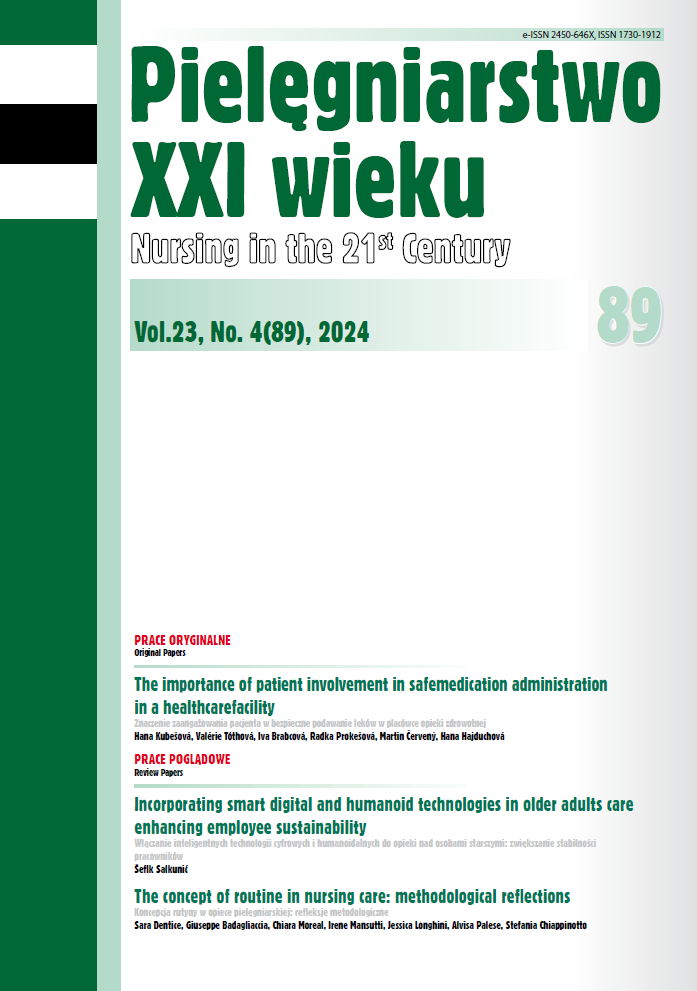Selected aspects of parenthood in the perception of men – Part I
DOI:
https://doi.org/10.12923/pielxxiw-2024-0046Keywords:
pregnancy, attitudes, menAbstract
SELECTED ASPECTS OF PARENTHOOD IN THE PERCEPTION OF MEN – PART I
Aim. The aim was to investigate the attitudes of men who plan to become fathers or not, and who either attend antenatal classes with their wife/partner or do not.
Material and methods. The study included three groups of 200 men: I – those who did not plan to become a father within the next year, II – those who were going to become fathers within the next year but did not attend antenatal classes, III – those who were gping to become fathers within the next year and attended antenatal classes. The original questionnaires were used.
Results. Pregnancy should be planned according to 81.8% of respondents. When it comes to 87.2% of men, they reported that man should support pregnant wife/partner, while 65.5% believed that joint visits to the doctor were pointless. Respondents most often preferred interactions between mother and father with the future child in her womb, such as stroking the belly (43% vs. 29.8%) and talking to the baby (31% vs. 19.8%).
Conclusions. Most men reported pregnancy should be planned. Men had problems with declaring whether the father should be on paternity leave after the birth, and there was no infl uence of the duration of the marriage, the fact of having children, the age of the respondents and education, and the place of residence had infl uence on the above.
References
1. Machalica W. Partnerski model rodziny. Zeszyty Karmelitańskie. Poznań. 2007;
2. Heinrich CJ. Parents’ employment and children’s wellbeing. Future Child. Spring. 2014; 24(1):121-146.
3. Malina J. Rola ojca we wspołczesnej rodzinie. Wychowanie Rodzinne. 2018; XVII: 369-379.
4. Lipowska M, Łada-Maśko AB, Lipowski M. Fathers’ coping strategies and children’s temperament as predictors of parental attitudes among polish fathers. Men and Masculinities. 2021; 24(1): 23-45.
5. Vischer LC, Heun X, Steetskamp J, et al. Skala C. Birth experience from the perspective of the fathers. Arch. Gynecol. Obstet. 2020; 302(5): 1297-1303.
6. Dabb C, Dryer R, Brunton RJ, et al. Paternal pregnancy-related anxiety: Systematic review of men’s concerns and experiences during their partners’ pregnancies. J. Affect. Disord. 2023; 323: 640-658.
7. John-Akinola YO, Babatunde OO, Desmennu AT. Perspectives of women about social support provided by men during pregnancy: a qualitative study. Matern Child Health J. 2022; 26(6): 1255-1260.
8. Kane J, Lohan M, Kelly C. Adolescent men’s attitudes and decision making in relation to pregnancy and pregnancy outcomes: An integrative review of the literature from 2010 to 2017. J Adolesc. 2019; 72: 23-31.
9. Bodin M, Kall L, Tyden T, et al. Exploring men’s pregnancy-planning behaviour and fertility knowledge:a survey among fathers in Sweden. Ups. J. Med. Sci. 2017; 122(2): 127-135.
10. Johansson M, Benderix Y, Svensson I. Mothers’ and fathers’ lived experiences of postpartum depression and parental stress after childbirth: a qualitative study. Int. J. Qual. Stud. Health Well-being. 2020; 15(1): 1722564.
11. Kalita J, Krzyczkowska-Sendrakowska M. Elementy psychologii perinatalnej. W: Kalita J. (red.). Wybrane zagadnienia intensywnego nadzoru położniczego. Krakow: Wyd. Przegląd Lekarski. 2000: 452-453.
12. Łukasik R, Waksmańska W, Golańska Ż, et al. Rożnice w wyobrażeniach matki i ojca o życiu prenatalnym dziecka. Probl. Pielęg., 2007; 15(4): 254-261.
13. Kossakowska K, Śliwerski A. Factors affecting mother-infant bonding in a Polish group of mothers. Sex Reprod Healthc. 2023; 37: 100880.
14. Bidzan M. Nastoletnie matki: psychologiczne aspekty ciąży, porodu i połogu. Krakow: Oficyna Wydawnicza „Impuls”; 2007: 1-97.
15. Rolle L, Gullotta G, Trombetta T, et al. Father involvement and cognitive development in early and middle childhood: a systematic review. Front Psychol. 2019; 10: 2405.
16. Simonelli A, Parolin M, Sacchi C, et al. The role of father involvement and marital satisfaction in the development of family interactive abilities: a multilevel approach. Front. Psychol. 2016; 7: 1725.
17. Trombetta T, Giordano M, Santoniccolo F, et al. Pre-natal attachment and parent-toinfant attachment: a systematic review. Front Psychol. 2021; 12: 620942.
18. Kornas-Biela D. Pedagogika prenatalna. Nowy obszar o wychowaniu. Lublin: Wyd. KUL; 2009, s. 1-553.
19. Narayanan DZ, Takahashi DY, Kelly LM, et al. Prenatal development of neonatal vocalizations. Elife. 2022;11: e78485.
20. Fagard J, Esseily R, Jacquey L, et al. Fetal origin of sensorimotor behavior. Front Neurorobot. 2018; 12: 23.
21. Missonnier S. The genesis of perinatal clinical psychology and its contemporary issues. Front Psychiatry. 2023; 14: 1090365.
22. Zheng LR, Naurin E, Markstedt E, et al. Expectant parents’ emotions evoked by pregnancy: A longitudinal dyadic analysis of couples in the Swedish Pregnancy Panel. Soc. Sci. Med. 2022; 312: 115362.
Downloads
Published
Issue
Section
License
Copyright (c) 2025 Authors

This work is licensed under a Creative Commons Attribution 4.0 International License.




